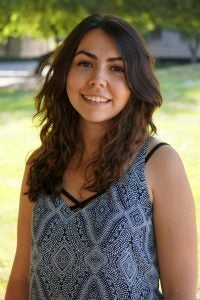 Merve Demir
Merve Demir
Education:
B.S. Chemical Engineering, B.S. Chemistry, Bogazici University 2016
From: Istanbul, Turkey
Joined the David Lab: January 2017
Outside of lab: I love traveling, hiking, cooking and spending time with my family and friends.
Research in David Lab:
My work in the David lab focuses on elucidating the working mechanism of DNA glycosylase MutY. This enzyme can recognize the OG:A mispair and cleave the adenine from the DNA allowing other enzymes in the base excision repair pathway to restore the integrity of the DNA. Deficiency in repair of the OG:A mispair has been linked to a syndrome known as MUTYH-Associated Polyposis (MAP) that predisposes individuals to colorectal cancer. By elucidating the mechanism of the enzyme, we can gain insight into how MAP variants related to this syndrome have altered activities.
Recently proposed mechanism of the enzyme by the David lab involves formation of a covalent intermediate that stabilizes the oxacarbenium ion intermediate after the cleavage of the adenine. This allows release of the adenine through an exit channel in the active site. In order to confirm the formation of the covalent intermediate and the mode of release of the adenine from the active site, I use a range of different experimental techniques from synthesis of transition state analogs to biochemical and crystallographic studies of the enzyme.
Previous Research Experience:
As an undergrad, I worked in Dr. Duygu Avci’s lab at Bogazici University to synthesize a phophonate containing dental monomer with properties such as high polymerization rate, hydrolytic stability and ability to form favorable interactions with the tooth material. I also worked in Fujimoto Research Group at Keio University as a summer trainee where I worked on solid and solution phase synthesis of fluorescent-labeled lipopeptide as TLR2 ligand. In my senior year, I worked in Aviyente Research Group at Bogazici University doing quantum mechanical calculations of Diels-Alder reactions in ionic liquids and in Pemra Doruker’s lab at Bogazici University exploring ligand binding sites of glycolytic enzymes in different species by using computational solvent mapping.
